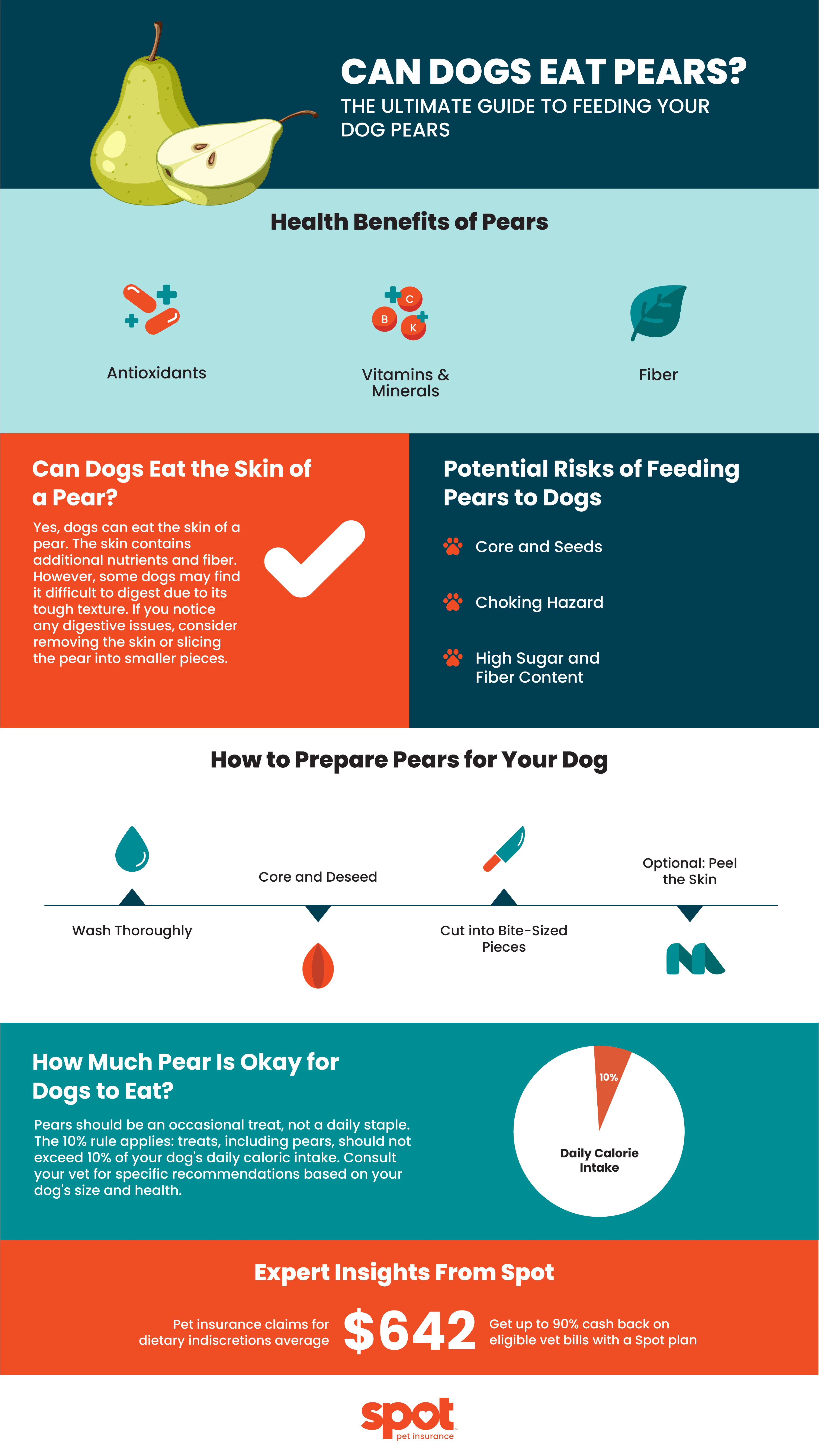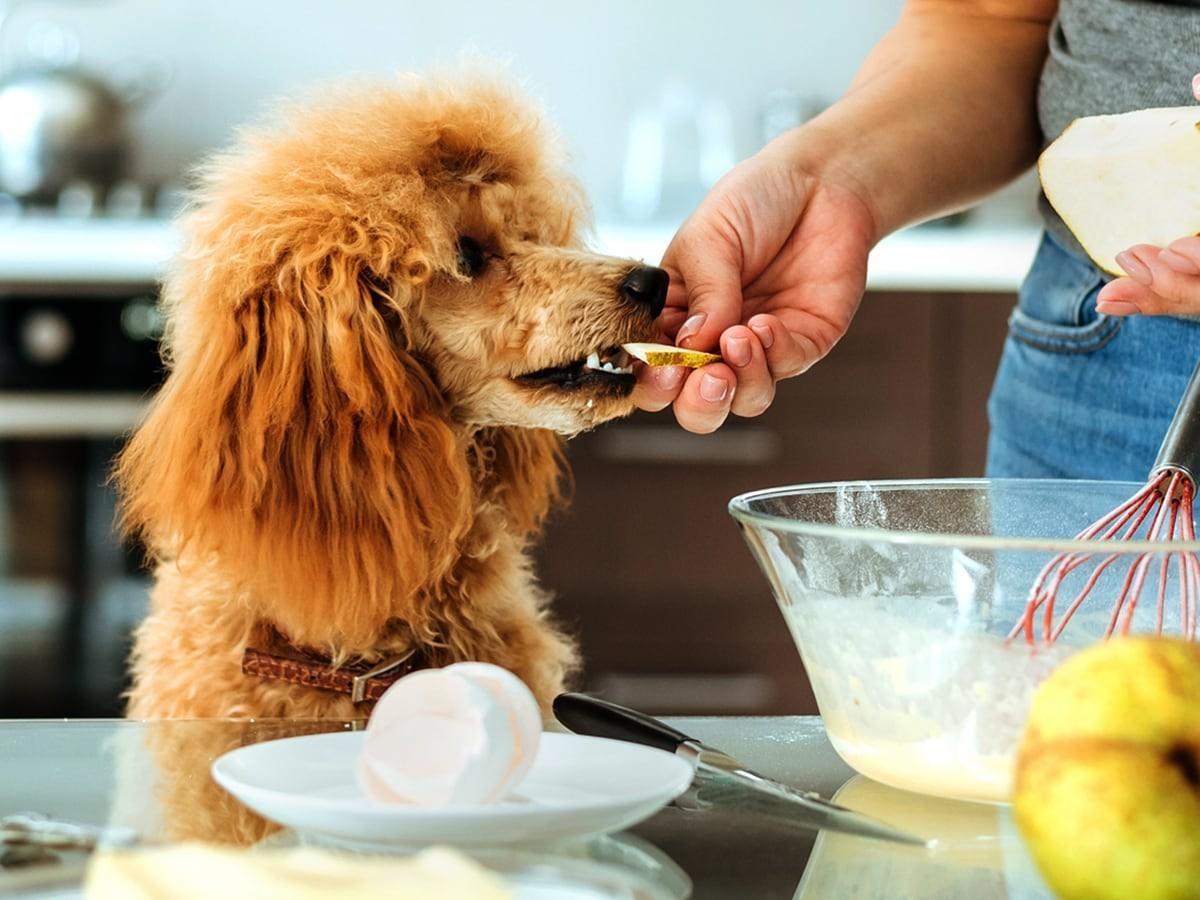Pears are a delicious and refreshing fruit that many of us enjoy, but can we share this sweet treat with our furry friends? You might be asking yourself, "Can dogs eat pears?" or "Are pears safe for dogs?" The simple answer is yes but with a few important considerations. Let's delve into the world of pears for dogs, exploring their benefits, potential risks, and how to prepare them safely.

Are Pears Good for Dogs?
Pears offer several health benefits that can contribute to your dog's well-being:
Vitamins and Minerals: Pears are a good source of vitamins A, C, and K, which support immune health, vision, and blood clotting. They also provide essential minerals like potassium for muscle and nerve function.
Fiber: The fiber in pears aids in digestion and helps regulate bowel movements, contributing to a healthy gut.
Antioxidants: Pears are rich in antioxidants like beta-carotene, which help protect cells from damage caused by free radicals.
Potential Risks of Feeding Pears to Dogs
While pears themselves are not toxic, there are a few precautions to take:
Core and Seeds: The core and seeds of a pear contain cyanide, a toxin that can be harmful to dogs. Always remove these before offering pears to your dog.
Choking Hazard: The core and seeds can also be choking hazards, especially for smaller dogs. Cut pears into small, manageable pieces to prevent this.
High Sugar and Fiber Content: Pears contain natural sugars and fiber, which can cause digestive upset like diarrhea or vomiting if consumed in excess. Moderation is key!
Can Dogs Eat Pears with Skin?
Yes, dogs can eat pear skin. The skin contains additional nutrients and fiber. However, some dogs may find it difficult to digest due to its tough texture. If you notice any digestive issues, consider removing the skin or slicing the pear into smaller pieces.
What Fruit Can't a Dog Eat?
While many fruits are safe for dogs, some are toxic and should be avoided:
Which Fruit Can Dogs Eat?
Several fruits make excellent treats for dogs, offering various health benefits:
Oranges: Rich in vitamin C and antioxidants.
Peaches: Provide vitamins A and C, but remove the pit.
Pineapple: Contains bromelain, which aids in digestion.
Raspberries & Strawberries: Packed with antioxidants and vitamins.
Tomatoes: Ripe tomatoes are safe in moderation. (Never feed a dog unripe tomatoes!)
Watermelon: A hydrating treat rich in vitamins and antioxidants.
Remember: Always introduce new fruits gradually and in moderation to monitor your dog's tolerance.
How Much Pear Can I Give My Dog?
Pears should be an occasional treat, not a daily staple. The 10% rule applies: treats, including pears, should not exceed 10% of your dog's daily caloric intake4. Consult your vet for specific recommendations based on your dog's size and health.
How to Prepare Pears for Your Dog
Wash Thoroughly: Wash the pear to remove any pesticides or dirt.
Core and Deseed: Remove the core and seeds to avoid cyanide poisoning and choking hazards.
Cut into Bite-Sized Pieces: Cut the pear into small, manageable pieces, especially for smaller dogs or those prone to choking.
Optional: Peel the Skin: You can peel the skin if your dog has difficulty digesting it.
Can Puppies Eat Pears?
Yes, puppies can eat pears as long as they are prepared safely (cored, deseeded, and cut into small pieces). However, introduce pears gradually and in moderation, as their digestive systems are still developing.
Expert Insights From Spot
Spot's internal data shows that pet insurance claims for dietary indiscretions average $642,* highlighting the importance of caution and research before sharing snacks with your pets.
Key Takeaway
In conclusion, pears can be a safe and healthy treat for your dog when prepared properly and given in moderation. They offer valuable nutrients and can be a tasty addition to your dog's diet. Always remember to remove the core and seeds, and introduce pears gradually to monitor for any adverse reactions. If you have concerns about your dog's diet or any specific foods, consult your veterinarian for personalized advice.

The resident animal enthusiast at Spot. I have a lifetime of pet parent experience. If it has fur, feathers, or scales, I’ve probably shared my home with it. I aim to be a reliable source, blending experience with a dedication to the well-being of pets.
*Jan 2019 to Aug 2024 Spot Pet Insurance Services, LLC claims data.
"Can Dogs Eat Pears?" Butternut Box, 21 Dec. 2023, https://butternutbox.com/blog/can-dogs-eat-pears.
Barker, Sean. "What Can’t Dogs Eat: 26 Foods That Dogs Can’t Eat." PolyTunnel Gardening, 11 Feb. 2023, https://blog.firsttunnels.co.uk/foods-that-dogs-cant-eat/.
Malmanger, Ellen. "What Fruits Can Dogs Eat?" PetMD, 22 Apr. 2025, https://www.petmd.com/dog/nutrition/what-fruits-can-dogs-eat.
Burke, Anna. “How Many Treats to Give a Dog a Day.” American Kennel Club, 7 Feb. 2023, www.akc.org/expert-advice/nutrition/how-many-treats-can-dog-have/.
The information presented in this article is for educational and informational purposes only and does not constitute or substitute for the advice of your veterinarian.












